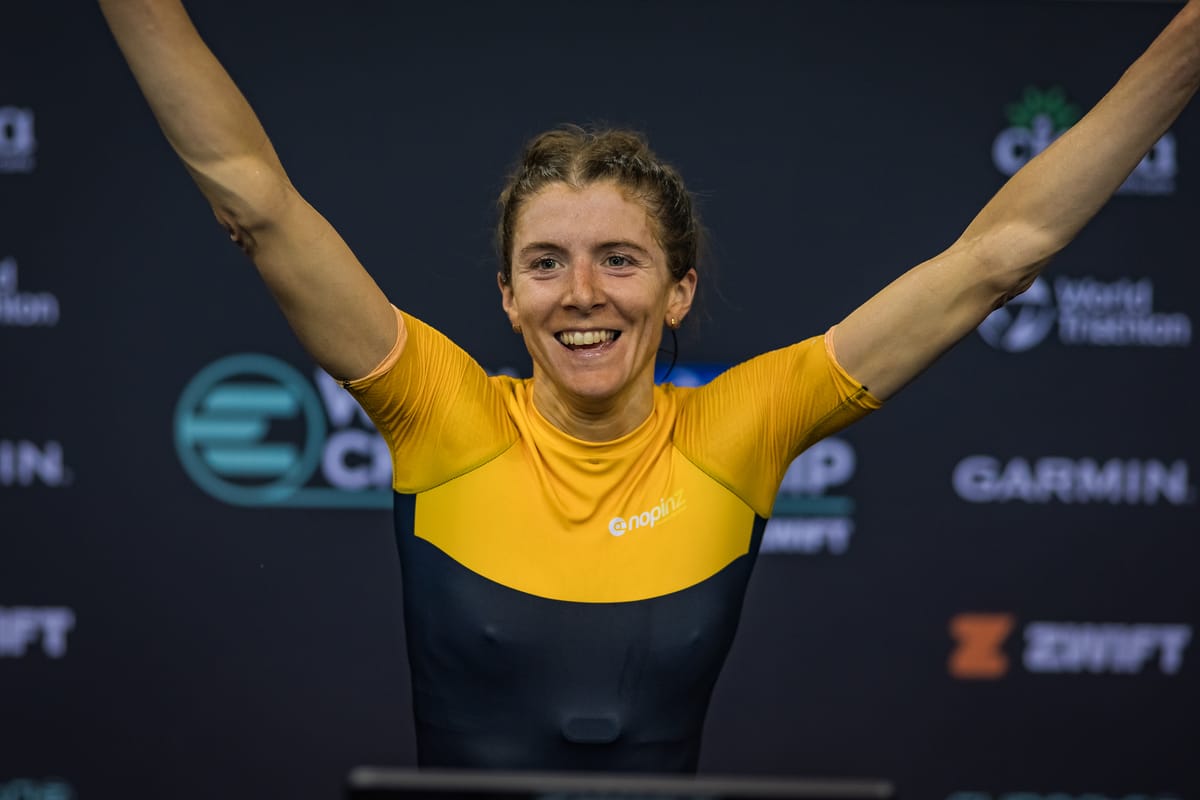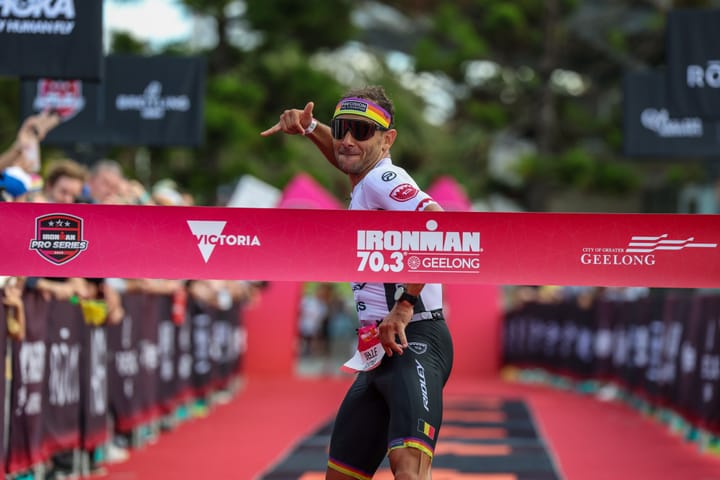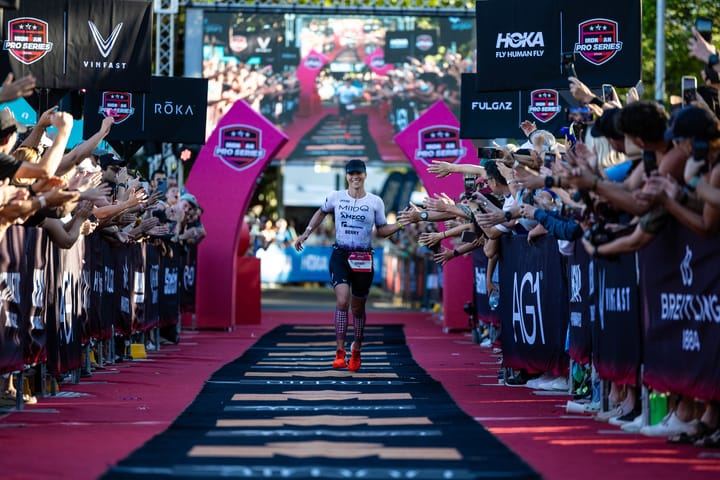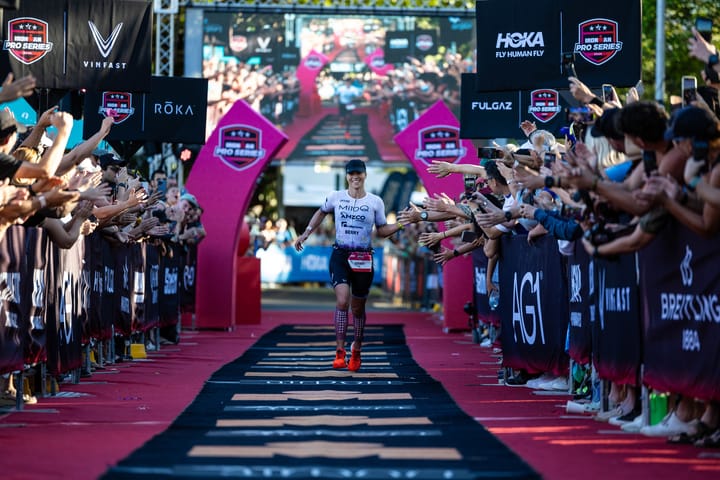Beth Potter Captures supertri E World Triathlon Crown in Thrilling Showdown
Beth Potter win in a tight race against Cassandre Beaugrand, seizing the supertri E world title at a dramatic London showdown.

An electric atmosphere filled the London Aquatics Centre for the supertri E World Triathlon Championship, where spectators witnessed fierce battles unfold across three short yet intense stages. This indoor-focused competition placed the athletes within full view from start to finish. Each competitor completed a series of 200-meter swims, 4-kilometer bike segments on static trainers, and 1-kilometer runs on treadmills, with transitions in the same enclosed area. The result was a constantly shifting contest in which minutes felt like hours and seconds felt like precious lifelines.
Beth Potter, the British favourite, and Cassandre Beaugrand, the French world number one, arrived as the top contenders. Before the women’s final even began, times from the morning heats suggested a close race. Both athletes are known for strong showings in shorter triathlon formats and each had already delivered impressive results in recent months. Katie Zaferes, the American star who performed well earlier in the season, joined them at the top of the pre-race predictions.




From the start of Stage 1, Potter and Beaugrand set the tone. Beaugrand established a blistering pace in the 200-meter swim, clocking about 2 minutes 12 seconds. That gap over Potter stretched a few meters in the water, but transitions played a huge role in this format. The first switch to the static bikes saw Potter quickly narrow Beaugrand’s advantage by the midpoint of the 4-kilometer ride. Live data displayed speeds hovering around 40 kilometers per hour, with power outputs reported near 300 watts. The two leaders exited the bikes simultaneously, while Zaferes and Tanja Neubert worked to remain within striking distance, roughly 10 to 20 seconds back.
The Stage 1 run segment on the treadmills highlighted Potter’s tactical approach. She opened a five-second gap on Beaugrand by the final strides, placing her in a strong position at the end of the stage. Zaferes finished around 19 seconds behind the leader. Observers remarked on Potter’s smooth transition, which often gained her small but valuable leads.
Stage 2 reversed the discipline order to a 1-kilometer run, a 4-kilometer bike, and a 200-meter swim. The top contenders started in the order of their finishing times from Stage 1. Potter and Beaugrand ran almost shoulder to shoulder, both splitting around 2 minutes 57 seconds, while Zaferes trailed by only a couple of seconds. Once again, transitions proved crucial. On the static bikes, Potter managed to bolt away first, gaining a 2-second gap over Beaugrand, but the French athlete reeled her in after a kilometer. Their head-to-head battle on the bikes showed the slight differences in pedaling style: Potter shifted her cadence more frequently, while Beaugrand maintained a consistent tempo.
When the second transition led to the 200-meter swim, Potter dived in first, but Beaugrand caught her within 50 meters. They swam stroke-for-stroke, mirroring each other’s pace. By the time they both touched the wall, only a few tenths of a second separated them. Yet the overall times indicated Potter still held a 5-second advantage from earlier segments. That slim margin hinted at a tense final stage. Zaferes emerged from the pool 12 seconds down, holding third place. Neubert and Lena Meibner lurked behind, ready to capitalize on any missteps from the frontrunners.
Stage 3 repeated the 200-meter swim, 4-kilometer bike, and 1-kilometer run, but used a pursuit start based on aggregate times. Potter set off first, followed by Beaugrand 5 seconds later, and Zaferes 30 seconds behind Potter. The intensity soared. Beaugrand erased the 5-second gap in the water, drawing level by the 100-meter mark. Both athletes pushed through the final stretch in nearly the same time, then sprinted to the bikes.
On that last bike leg, the two leaders produced yet another series of shifts in position. Data on the big screen above the pool showed they consistently pushed speeds around 40 kilometers per hour. They rode side-by-side, matching each other’s power outputs. Small gains made in the transitions again became decisive. As Beaugrand navigated the dismount, Potter slid into the lead by 1 second and charged toward the treadmills.
The run portion brought the crowd to its loudest. Potter surged ahead within the first 100 meters. Spectators noted Beaugrand showing signs of calf trouble, and the gap continued to widen. Potter maintained a relentless pace that stretched her advantage to around 25 seconds by the finish line. Beaugrand, clearly in discomfort, held on for second, preventing any late challenge from Zaferes. The American, a minute back, claimed the bronze medal and celebrated another strong performance after a series of podium finishes earlier in the year.
Beyond the podium, Neubert and Meibner took fourth and fifth respectively, displaying strong biking skills but losing time in transitions and on the runs. Meanwhile, several promising athletes, including rising Hungarian contender Fanni Szalai and home favorite Vicky Holland, did not progress from the morning heats—a reminder of the high-level competition that characterized this event.
The entire race featured quick transitions, short distances and repeated athletic bursts that kept everyone guessing. Each discipline demanded an all-out effort, which allowed spectators to see every athlete’s strengths and weaknesses in real time. Swim splits of just over 2 minutes, bike speeds of more than 40 kilometers per hour and sub-3-minute 1-kilometer runs became the norm for the top contenders. The format rewarded those who excelled in swift gear changes and fast off-the-line sprints.
Beth Potter’s final times were consistent across the stages—official data recorded about 11 minutes 53 seconds, 12 minutes 09 seconds, and 12 minutes 07 seconds. Those splits underscored her balance across all three disciplines and her ability to execute near-flawless transitions. By adding this supertri E world title to her existing accomplishments, Potter delivered a clear statement ahead of this summer’s Paris Olympic Games. Cassandre Beaugrand also confirmed her status among the sport’s elite, sticking with Potter until that decisive final run. Katie Zaferes proved once again that her podium-worthy form is no fluke.
Although supertri E differs from traditional triathlon formats, the high-energy environment and spectator-friendly viewing brought new fans into the sport. The tight showdown between Potter and Beaugrand offered a reminder that short, intense triathlon events can capture the same suspense and drama as any open-road race.
In the end, the results told a clear story. Potter’s victory at the supertri E World Triathlon Championship validated her strong preseason training and showcased how crucial each transition can be. Beaugrand’s runner-up finish highlighted her tenacity and promise for future events.





Comments ()